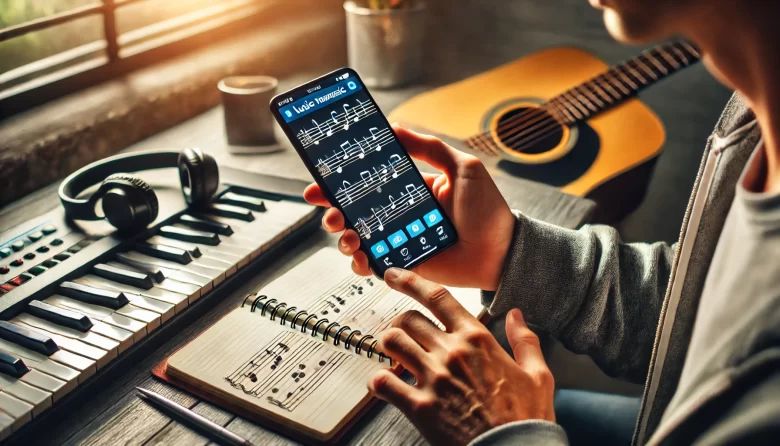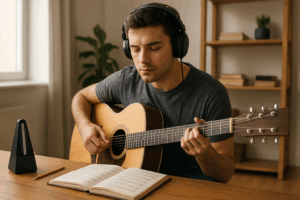In today’s digital age, learning music has never been more accessible — thanks to a wide range of apps designed specifically for beginners. Whether you’re learning to play an instrument, read music, or understand theory, there’s an app that can guide you step by step. These tools make practice more fun, structured, and effective, all from the convenience of your smartphone, tablet, or computer.
In this article, we’ll explore the best music learning apps for beginners, highlighting what each one offers and how they can help you grow as a musician.
Why Use Apps to Learn Music?
Learning music through apps offers several key advantages:
- Convenience: Learn anytime, anywhere.
- Personalized Learning: Many apps adapt to your level and pace.
- Interactive Tools: Real-time feedback helps reinforce learning.
- Fun Features: Gamified lessons keep you motivated.
- Wide Variety: You can find apps for theory, instruments, rhythm, ear training, and more.
Now let’s explore the top beginner-friendly music apps in different categories.
🎹 Apps for Learning Instruments
1. Yousician
Best for: Guitar, piano, bass, ukulele, and voice
- Offers interactive lessons with real-time feedback
- Tracks your progress and tailors difficulty
- Includes structured learning paths for total beginners
- Fun, game-like interface
Why it’s great: It turns music practice into an addictive experience while still teaching the right technique.
2. Simply Piano by JoyTunes
Best for: Beginner piano players
- Teaches you how to read sheet music and play with both hands
- Uses your device’s microphone to listen and give feedback
- Very beginner-friendly with clear instructions
Why it’s great: Perfect for those who want to learn piano at their own pace without needing a teacher at first.
3. Fender Play
Best for: Guitar, bass, and ukulele
- Created by Fender, a trusted name in instruments
- Video-based lessons from real musicians
- Progress tracking and genre-based paths
Why it’s great: Clean interface and great for beginners who want to learn popular songs.
🎼 Apps for Learning Music Theory
4. Tenuto
Best for: Learning note reading, intervals, chords, and more
- Interactive exercises for all key theory concepts
- Highly customizable quizzes
- No distractions — clean, focused interface
Why it’s great: Ideal for beginners who want to understand the building blocks of music.
5. Music Theory Helper
Best for: Android users wanting a free theory guide
- Includes lessons on scales, chords, circle of fifths, and more
- Simple, beginner-friendly design
- Works offline
Why it’s great: A great free alternative that covers essential theory topics.
🎧 Apps for Ear Training6. Perfect Ear
Best for: Ear training and rhythm development
- Identify intervals, chords, and melodies by ear
- Includes rhythm clapping and sight-singing exercises
- Customizable practice routines
Why it’s great: One of the most comprehensive ear training apps for beginners.
7. Functional Ear Trainer
Best for: Developing tonal recognition in a key
- Focuses on how notes sound in context, not just in isolation
- Simple exercises with strong educational value
- Great for beginners who want to improve musical intuition
Why it’s great: Trains your brain to hear notes as part of a song.
🥁 Apps for Rhythm and Timing
8. Rhythm Trainer
Best for: Improving your timing and rhythmic accuracy
- Exercises in clapping, counting, and playing along
- Different difficulty levels for gradual improvement
- Helps you understand syncopation and complex rhythms
Why it’s great: Great for any beginner who struggles with staying in time.
9. Metronome by Soundbrenner
Best for: Practicing at a consistent tempo
- Super accurate and highly customizable
- Visual and vibration-based feedback
- Includes polyrhythms and setlists
Why it’s great: A professional tool that’s also beginner-friendly.
📚 Apps for Sheet Music and Practice Tools
10. MuseScore
Best for: Viewing, editing, and downloading sheet music
- Massive community library of free sheet music
- Allows you to notate and arrange music
- Sync with playback to hear what you write
Why it’s great: Fantastic tool for learning how to read and write music.
11. Tonara
Best for: Making practice sessions more effective
- Connects students and teachers
- Tracks practice time and sends feedback
- Motivates with goals and streaks
Why it’s great: Keeps you accountable and consistent.
Choosing the Right App for You
When selecting an app, consider:
- Your instrument: Choose apps that specialize in your instrument.
- Your goals: Do you want to improve theory, technique, or ear training?
- Your learning style: Visual, interactive, or auditory learners may prefer different interfaces.
- Budget: Many apps offer free versions with optional upgrades.
Tips for Using Music Apps Effectively
- Be consistent: Practice daily, even if it’s just 10–15 minutes.
- Set goals: Use built-in tracking to aim for progress.
- Use headphones: Improves sound accuracy and minimizes distractions.
- Supplement with real playing: Apps are a tool — your instrument is where it all comes to life.
Final Thoughts: Turn Your Device into a Personal Music Coach
With the right apps, your smartphone or tablet can become a powerful ally in your musical journey. These tools make it easier to learn, stay motivated, and measure your growth — no matter your age or background.
Start simple, pick the app that feels most fun and useful for your needs, and let technology help you unlock your musical potential.




